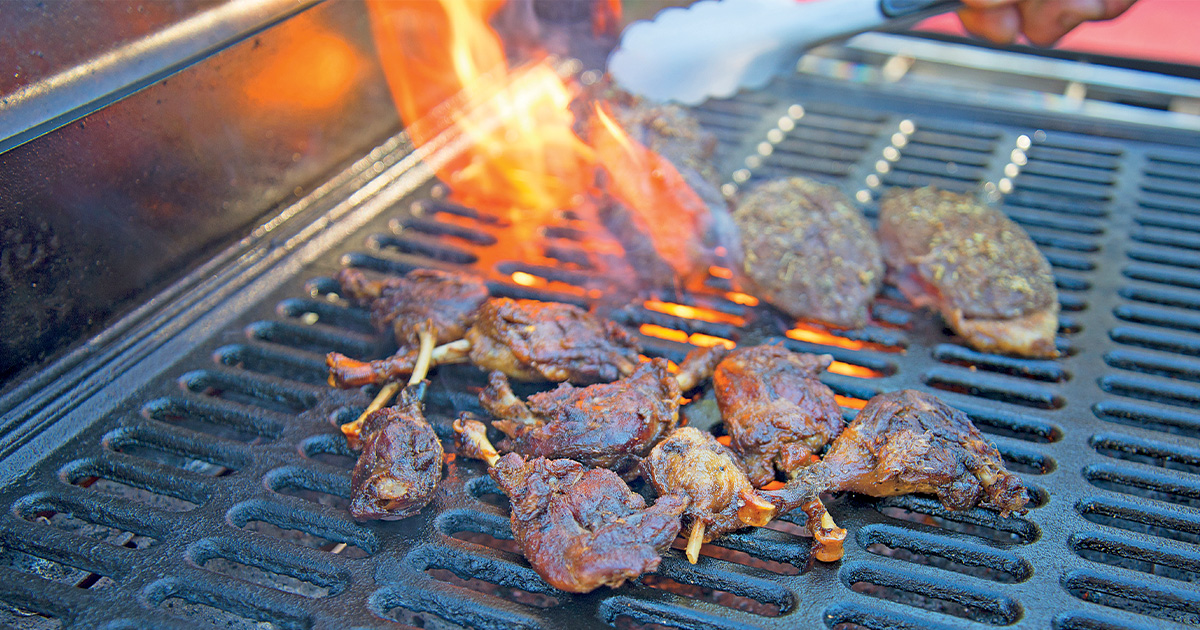Five Tips for Grilling Ducks and Geese
Follow this expert advice to grill waterfowl to perfection
Follow this expert advice to grill waterfowl to perfection

When it comes to cooking waterfowl, many folks are partial to grilling. It just seems natural that those of us who choose to spend our free time outdoors would also prefer the simplicity of open-flame cooking. A well-grilled duck that's crispy on the outside and moist and flavorful in the middle is, after all, hard to beat.
Here are five handy tips that will help you prepare delicious ducks and geese at your next backyard barbecue.
As enticing as an array of whole grilled ducks may look on a platter, that's not the ideal way to cook them. To ensure that legs and thighs will be tender and juicy, give them a good head start when grilling. Remove the legs from the body, rub them with your favorite seasoning, and brown them evenly over a medium-hot flame. Once browned, place them in a foil pan with about 1 inch of broth, wine, or beer on the bottom. Cover and place the pan on the grill, away from direct heat, for about 2 hours. Check the pan every 30 minutes or so to make sure that the liquid has not evaporated; add additional liquid as needed. Once you are ready to grill the breasts or split ducks, transfer the tender legs to the grill grates. Your guests will marvel at how you were able to make otherwise tough legs into tasty, fall-off-the-bone delights.
Brining not only adds flavor and moisture, but also reduces cooking time and removes excess blood from ducks and geese before grilling. Start by heating 4 cups of water in a saucepan. Add 1 cup each of kosher salt and brown sugar; stir until dissolved. Allow the brine solution to cool completely, then add 3 1/2 quarts of ice-cold water. Place thawed or fresh duck or goose parts in a resealable bag or tub. Pour the brine over the birds and refrigerate for 12 to 24 hours. After the birds are brined, rinse and pat them dry. Then fire up the grill.

A good marinade should enhance, not disguise, the natural flavor of grilled waterfowl. All too often, game cooks use potent solutions to make ducks and geese taste like something other than waterfowl. Instead of overpowering your game birds, bathe them for several hours in a flavorful marinade of olive oil, garlic, salt, pepper, Dijon mustard, red wine vinegar, and fresh herbs. Make enough extra marinade to baste the birds while they're cooking and reserve some fresh marinade to drizzle over them before serving.
Applying a blend of salt and pepper, herbs, and other seasonings a day or even a few hours before grilling is a quick way to jazz up waterfowl. Unlike marinades, dry rubs don't soak as deeply into the bird. But it's the outside that gets the first bite. Rubs come in many flavor combinations and can be adjusted to suit individual tastes. For most folks, a balanced rub that adds salty, savory, sweet, and spicy flavors makes for good grilling. Wrapping dry-rubbed ducks and geese in plastic wrap before refrigerating them for several hours will add more flavor to the cooked birds.

Before putting game to flame, the grill grates should be clean, well-lubricated with vegetable oil, and preheated. Smaller birds like teal and wood ducks cook quickly and should be grilled over medium-high heat. Larger ducks and geese, and thick goose breast fillets, are best cooked over medium heat to avoid burning the outside before the middle of the meat is done. If you place a big Canada goose breast over a screaming-hot flame, the outer layer will taste livery by the time the center is a perfect medium-rare. You can also butterfly large goose breast fillets before grilling to help them cook more evenly.
Ducks Unlimited uses cookies to enhance your browsing experience, optimize site functionality, analyze traffic, and deliver personalized advertising through third parties. By continuing to use this site, you agree to our use of cookies. View Privacy Policy